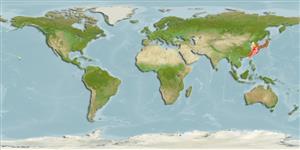Seriola quinqueradiata Temminck & Schlegel, 1845
Japanese amberjack
個人による観察記録の追加 Fish Watcher
| Native range | All suitable habitat | Point map | Year 2050 |

|
| This map was computer-generated and has not yet been reviewed. |
| Seriola quinqueradiata AquaMaps Data sources: GBIF OBIS |
Upload your 写真 and ビデオ
Pictures | Stamps, coins, misc. | グーグルの画像Seriola quinqueradiata
Picture by Suzuki, T.
Pictures | Stamps, coins, misc. | グーグルの画像Seriola quinqueradiata
Picture by Suzuki, T.
Korea (South) country information
Common names:
Pang-ǒ, Yellowtail, 방어
Occurrence: native
Salinity: marine
Abundance: | Ref:
Importance: | Ref:
Aquaculture: commercial | Ref: FAO Fishery Information, Data and Statistics Service, 1993
Regulations: | Ref:
Uses: no uses
Comments: Reported from the coastal water of Tongyeong (Ref. 49924). Also Ref. 559.
National Checklist:
Country Information: https://www.cia.gov/library/publications/resources/the-world-factbook/geos/ks.html
National Fisheries Authority:
Occurrences: Occurrences Point map
Main Ref: Kim, I.S., Y. Choi, C.L. Lee, Y.J. Lee, B.J. Kim and J.H. Kim, 2005
National Database:
Occurrence: native
Salinity: marine
Abundance: | Ref:
Importance: | Ref:
Aquaculture: commercial | Ref: FAO Fishery Information, Data and Statistics Service, 1993
Regulations: | Ref:
Uses: no uses
Comments: Reported from the coastal water of Tongyeong (Ref. 49924). Also Ref. 559.
National Checklist:
Country Information: https://www.cia.gov/library/publications/resources/the-world-factbook/geos/ks.html
National Fisheries Authority:
Occurrences: Occurrences Point map
Main Ref: Kim, I.S., Y. Choi, C.L. Lee, Y.J. Lee, B.J. Kim and J.H. Kim, 2005
National Database:
Common names from other countries
分類 / Names 共通名の | 類義語 | Catalog of Fishes(部類, 種) | ITIS | CoL | WoRMS | Cloffa
> Carangiformes (Jacks) > Carangidae (Jacks and pompanos) > Naucratinae
Etymology: Seriola: Latin word diminutive with the meaning of a large earthenware pot (Ref. 45335).
More on authors: Temminck & Schlegel.
Etymology: Seriola: Latin word diminutive with the meaning of a large earthenware pot (Ref. 45335).
More on authors: Temminck & Schlegel.
Environment: milieu / climate zone / depth range / distribution range 生態学
海 底生の; 海洋回遊性 (Ref. 51243); 深さの範囲 ? - 100 m. Subtropical; 46°N - 20°N, 116°E - 153°W
分布 国々 | 国連食糧農業機関の区域 | エコシステム | 事件 | Point map | 導入 | Faunafri
Northwest Pacific: Japan and the eastern Korean Peninsula to the Hawaiian Islands.
サイズ / 重さ / 年齢
Maturity: Lm ? range ? - ? cm
Max length : 150 cm TL オス/雌雄の選別がない; (Ref. 9988); 最大公表体重: 40.0 kg (Ref. 9988)
Max length : 150 cm TL オス/雌雄の選別がない; (Ref. 9988); 最大公表体重: 40.0 kg (Ref. 9988)
簡単な記述 検索表 | 形態学 | 形態計測学
背面の脊椎 (合計) : 6 - 7; 背鰭 (合計) : 29 - 36; 肛門の骨: 3; 臀鰭: 17 - 22; 脊つい: 24. Scutes absent. Compared to S. lalandi, the species' dorsoposterior corner of upper jaw is angular (versus rounded) and the pectoral and pelvic fins are almost equal in length (versus pectoral shorter than pelvic fin).
Adults exhibit shoaling habit (Ref. 9988). They feed on plankton. Juveniles are found among floating seaweeds (Ref. 12114, 12115). Collection of young is the basis for prosperous aquaculture in Japan. Raised in captivity and marketed fresh for sashimi (Ref. 9988).
Life cycle and mating behavior 成熟 | 繁殖 | 放精 | 卵 | 生産力 | 幼生
主な参考文献
Upload your references | 参考文献 | コーディネーター : Smith-Vaniz, William F. | 協力者
Robins, C.R., R.M. Bailey, C.E. Bond, J.R. Brooker, E.A. Lachner, R.N. Lea and W.B. Scott, 1991. World fishes important to North Americans. Exclusive of species from the continental waters of the United States and Canada. Am. Fish. Soc. Spec. Publ. (21):243 p. (Ref. 4537)
人間に対する脅威
Harmless
Human uses
水産業: 高い商業の; 水産養殖: 商業; ゲームフィッシュ: はい
FAO(Aquaculture systems: 代謝, 種の外形; publication : search) | FishSource | 私達の周りの海
より多くの情報
Population dynamics
成長のパラメーター
Max. ages / sizes
Length-weight rel.
Length-length rel.
体長組成
Mass conversion
補充
豊度
成長のパラメーター
Max. ages / sizes
Length-weight rel.
Length-length rel.
体長組成
Mass conversion
補充
豊度
Physiology
Body composition
Nutrients
酸素消費
水泳形態
泳ぐ速さ
Visual pigments
Fish sound
Diseases & Parasites
Toxicity (LC50s)
Body composition
Nutrients
酸素消費
水泳形態
泳ぐ速さ
Visual pigments
Fish sound
Diseases & Parasites
Toxicity (LC50s)
用具
E-book | 野外観察図鑑 | Length-frequency wizard | 生活史の基盤ツール | 目的のマップ | Classification Tree
| Catch-MSY |
特記事項
XMLをダウンロードして下さい
インターネットの情報源
Aquatic Commons | BHL | Cloffa | Websites from users | Check FishWatcher | CISTI | Catalog of Fishes(部類, 種) | DiscoverLife | ECOTOX | Faunafri | Fishtrace | GenBank(ゲノム, ヌクレオチド) | GloBI | GOBASE | | Google Books | Google Scholar | Google | IGFA World Record | MitoFish | 国のデーターベース | Otolith Atlas of Taiwan Fishes | PubMed | Reef Life Survey | Scirus | SeaLifeBase | 生命の木 | Wikipedia(行く, 検索する) | World Records Freshwater Fishing | Zoobank | 動物に関する記録
Estimates based on models
Phylogenetic diversity index (Ref. 82804): PD50 = 0.5020 [Uniqueness, from 0.5 = low to 2.0 = high].
Bayesian length-weight: a=0.01122 (0.00514 - 0.02450), b=3.04 (2.87 - 3.21), in cm Total Length, based on all LWR estimates for this body shape (Ref. 93245).
栄養段階 (Ref. 69278): 4.0 ±0.65 se; based on food items.
回復力 (Ref. 120179): 手段, 1.4年~4.4年の倍増期間の最小個体群 (K=0.3-0.5).
Prior r = 0.57, 95% CL = 0.38 - 0.85, Based on 1 data-limited stock assessment.
Fishing Vulnerability (Ref. 59153): Moderate to high vulnerability (52 of 100).
Climate Vulnerability (Ref. 125649): Very high vulnerability (100 of 100).




